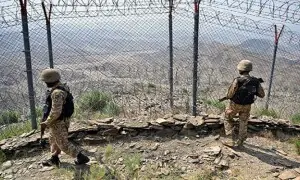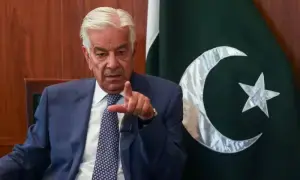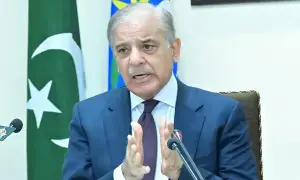Pakistan to start using Saudi oil facility from next month: Shaukat Tarin
5 min readFinance Minister Shaukat Tarin on Friday informed the Senate that Pakistan would use the Saudi oil facility - worth over a billion dollars - on deferred payment from next month as the country was currently using its own reserves.
Last year in October, Saudi Arabia had agreed to revive its $4.2 billion worth of financial support – including $1.2 billion worth of oil on deferred payments – to Pakistan during Prime Minister Imran Khan’s visit to the kingdom. Following this, the State Bank of Pakistan in December received $3 billion from Saudi Arabia that was expected to boost the country’s foreign exchange reserves.
“Amidst this, the timeframe [for the Saudi financial support] is one year. If needed, we can ask for an extension in the loan payment, I don’t think we need to roll over it. We asked for [the loan] one year and they gave us,” the finance minister said during the question and hour session of the upper house of parliament which was presided over by Chairman Sadiq Sanjrani.
Tarin was responding to the supplementary questions of the lawmakers on the Saudi Arabia loan facility and other economic factors.
To a question over the increasing interest rate from 3.25% to 4% on the Saudi loan facility, he said the latter one was “better” with respect to the “changing interest rate environment.” He added there was not any clause associated with the financial support.
The above-mentioned question was raised by opposition senator Mushtaq Ahmed, who also criticised the government for asking everyone for loans. He argued that Pakistan would have to pay $120 million more with the 4% interest rate.
The finance minister was of the view that the country did not need to roll over it and the four per cent interest rate was “fine” as compared to other lenders. He further added that the country’s exports, SBP reserves, and remittances have been increased.
“Conditionality, which is imposed by the lender, does not mean that they will be enforced,” Tarin said while responding to another query on any conditions on the loan. However, he agreed that the Saudi Development Fund would take the facility back if the country were to default to any international organisation. He further expressed hope the country would not default and the loan could be used.
On increasing import bills, Tarin said the biggest reason for such an uptick was the global increase in oil prices, adding that per barrel of oil price was currently $92 from $42 in January.
“Financing is done through exports,” he said and admitted that earlier there was pressure on the rupee as it moves on both sides because of free float. He called that “real effective exchange rate,” which compares the currency with the competitor rate. “Rupee is not undervalued as such with there being a difference of one or two rupees in the market.”
To another query on the import of coal, he said that a few plants were run on coal from Thar and some were run on imported coal, which contributed to the import bill. He claimed that the government has reduced sales tax on the oil price and just increase the fuel prices by 35 per cent.
In response to another query, he said that the country could not stop importing oil as the economy was dependent on it.
Balochistan issues
During the session, an opposition lawmaker raised a question on the committees announced for Balochistan development. No lawmakers from either side of the aisle have been included in the committees, he said, adding that military personnel and secretaries have been made part of it.
In response, Parliamentary Affairs Minister Ali Muhammad Khan said that the apex committee was presided over by Balochistan chief minister and the planning minister also reviews it. “At the Centre, PM is monitoring it and at the province, the CM is monitoring it. They are elected people, so no perception should be made that unelected people are observing it,” he added.
He further read the development projects announced for the resource-rich but poverty-stricken provinces on a lawmaker’s concern over no schemes.
PPP Senator Raza Rabbani called for a comprehensive debate on Balochistan issues, saying that the province’s problem was related to the right of the people as enshrined in the Constitution
“Balochistan problem is not just security or development projects or political. The province’s problem in reality is the right of the people of Balochistan as enshrined in the constitution. Their problem is missing persons… mere meeting those families won’t resolve it,” he said.
He recalled Finance Minister Tarin-led Economic Coordination Council decision to again approve the Saindak project lease. Tarin said that it was decided under the Agaaz-e-Huqooq-e-Balochistan in 2017 to return the land to Balochistan. However, he said the previous federal governments – including the PPP – did not follow the procedure. “It is against Article 172 (3) of the Constitution,” he said, adding that two times lease was renewed.
“Sad to see, the government still has not made any such system that can ensure 50% ownership of province,” he said.
Rabbani further raised the foreign policy issue and shared Premier Imran Khan and Foreign Minister Shah Mahmood Qureshi’s recent statements.
“The government has no link to the foreign policy. It is decided by the establishment and the government is given by a dictation. Today’s PM’s statement is nothing but election positioning,” he said, adding that Pakistan’s strategic interest was in Asia.
“We are a proud nation and we will not sell our sovereignty at any cost. We saw our airbases were sold to the US under conditions, which are still unknown to this House and the presidency,” he said, “When you sign the IMF documents you surrender and you work on their dictation.”
‘Not a switch’
Moreover, Finance Minister Tarin said that coming out of the grey list of the Financial Action Task Force was not like using a switch as the global body looked at the background of the country’s performance.
“We are trying our best to come out of [FATF’s] grey list. We have met 27 conditions out of 28. We are being victimised, we are being pressurised. We will be able to come out of this,” he said.
For the latest news, follow us on Twitter @Aaj_Urdu. We are also on Facebook, Instagram and YouTube.






















Comments are closed on this story.